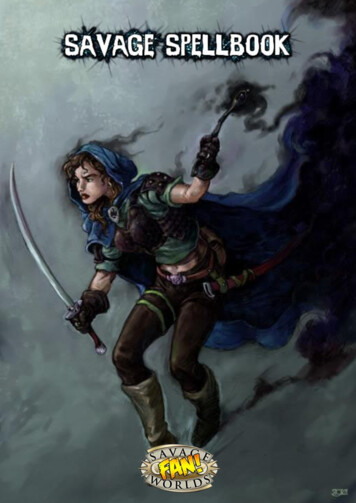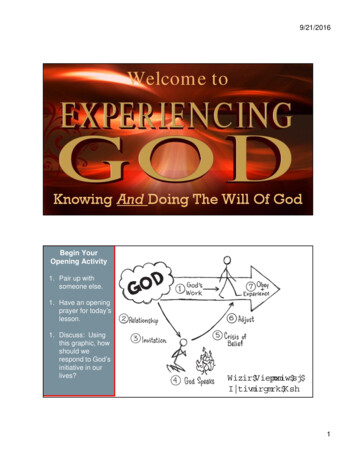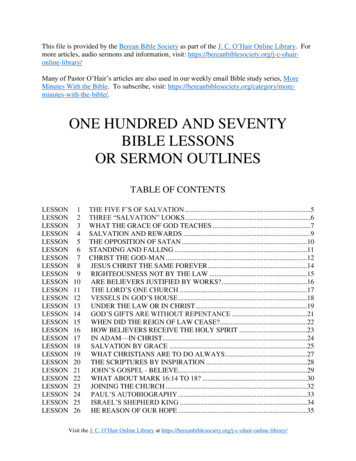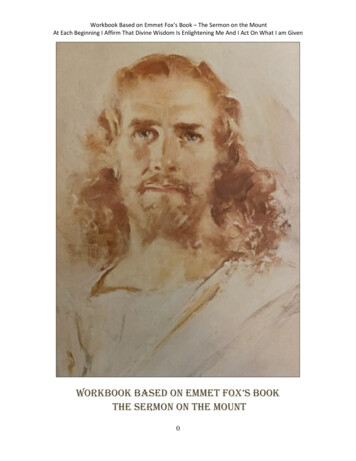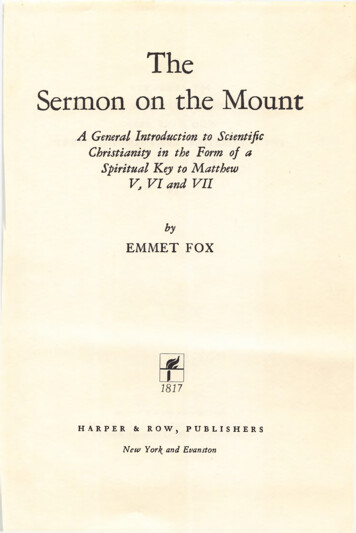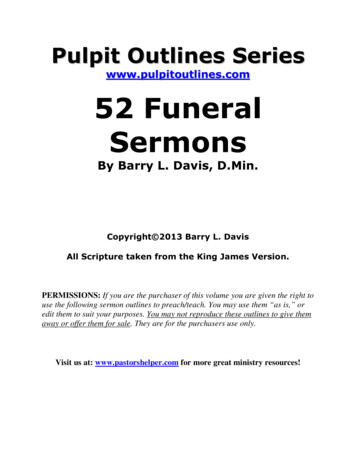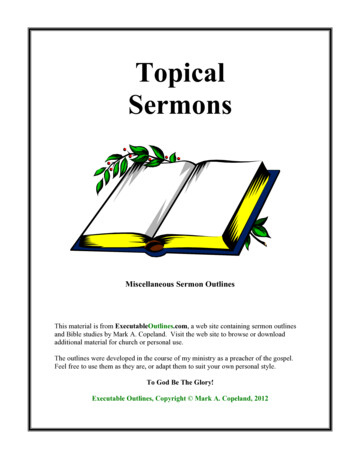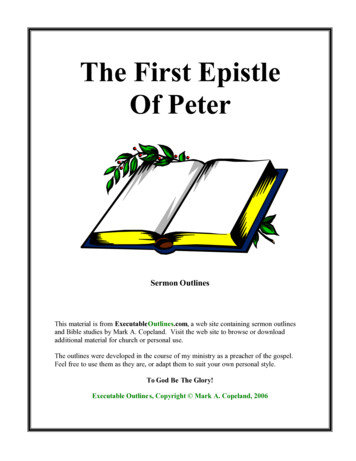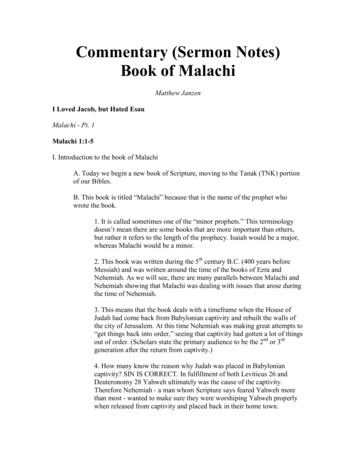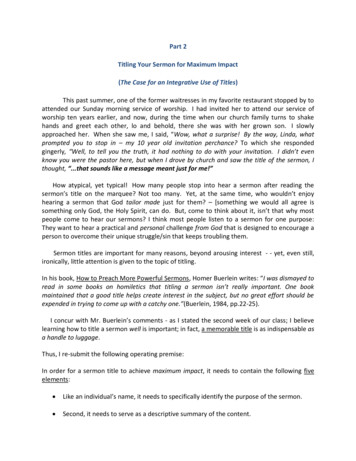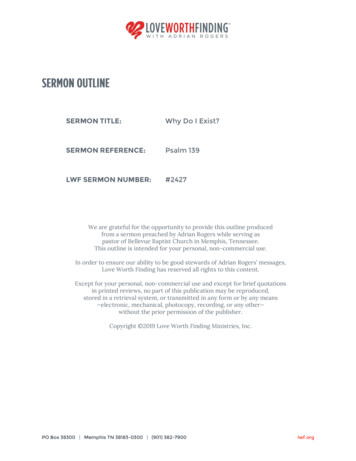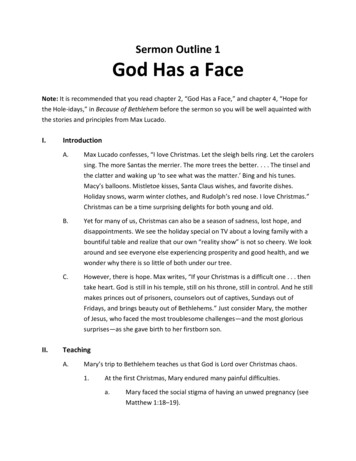
Transcription
Sermon Outline 1God Has a FaceNote: It is recommended that you read chapter 2, “God Has a Face,” and chapter 4, “Hope forthe Hole-idays,” in Because of Bethlehem before the sermon so you will be well aquainted withthe stories and principles from Max Lucado.I.IntroductionA.Max Lucado confesses, “I love Christmas. Let the sleigh bells ring. Let the carolerssing. The more Santas the merrier. The more trees the better. . . . The tinsel andthe clatter and waking up ‘to see what was the matter.’ Bing and his tunes.Macy’s balloons. Mistletoe kisses, Santa Claus wishes, and favorite dishes.Holiday snows, warm winter clothes, and Rudolph’s red nose. I love Christmas.”Christmas can be a time surprising delights for both young and old.B.Yet for many of us, Christmas can also be a season of sadness, lost hope, anddisappointments. We see the holiday special on TV about a loving family with abountiful table and realize that our own “reality show” is not so cheery. We lookaround and see everyone else experiencing prosperity and good health, and wewonder why there is so little of both under our tree.C.II.However, there is hope. Max writes, “If your Christmas is a difficult one . . . thentake heart. God is still in his temple, still on his throne, still in control. And he stillmakes princes out of prisoners, counselors out of captives, Sundays out ofFridays, and brings beauty out of Bethlehems.” Just consider Mary, the motherof Jesus, who faced the most troublesome challenges—and the most glorioussurprises—as she gave birth to her firstborn son.TeachingA.Mary’s trip to Bethlehem teaches us that God is Lord over Christmas chaos.1.At the first Christmas, Mary endured many painful difficulties.a.Mary faced the social stigma of having an unwed pregnancy (seeMatthew 1:18–19).
2.B.b.Mary, who was almost full-term, had to travel from Nazareth toBethlehem on foot or by donkey (see Luke 2:4–5).c.Mary, without family or friends, gave birth to Jesus in an animalshelter. She placed her newborn on manger straw (see Luke 2:7,12, 16).Illustration: Max, his wife, Denalyn, and their family once experienced apainful Christmas. On Christmas Eve, Max and Denalyn’s daughter Jennawas in the ER with a difficult pregnancy. Ultimately, she lost the baby. Allthe delights of that Christmas were hard reminders of their family’s loss.Mary’s trip to Bethlehem teaches us that God has a face and is with us.1.At the first Christmas, Mary gazed into the face of God.a.Isaiah’s prophecy and the angel’s announcement to Mary said hernewborn would be called Immanuel—which means “God with us”(see Isaiah 7:14; Matthew 1:22–23).b.Jesus entered our world not like a human but as a human.i.A heavenly angelic chorus celebrated his birth (see Luke2:13–14).ii.Shepherds raced to see Jesus, their long-awaited Savior(see Luke 2:16–20).c.Through a scandalous pregnancy, an imposed census, an untimelytrip, and an overcrowded inn, God triumphed in Mary’s story.d.Because God became one of us, he understands how we feel andthe struggles we face.2.Illustration: A medical missionary, George Harley, in 1926 lost his son,Bobby, to a deadly tropical fever.a.George had seen very little response from the Mano tribe to hisgospel teaching and medical care.b.When Bobby died, an elderly man of the Mano people sawGeorge weeping in deep grief at his son’s grave. The elder went tohis people, shouting, “White man, white man—he cries like us!”
c.III.George’s weeping face changed everything about his ministry.Thousands of Mano began responding to his Christian service.ApplicationA.God has a face. “The Word became flesh and lived among us” (John 1:14). Wesee the glory of God in the face of Christ (see 2 Corinthians 4:6). Will you fix youreyes on Jesus and discover that you are seeing God himself (see John 14:9)? “Youcannot face a crisis until you face God first.”B.The God among us rules the universe. God controls the chaos that troubles ourlives. Jesus healed the sick, fed the hungry, and even raised the dead. He is withus, our Immanuel. If this is a difficult time in your life, will you cast all your careson God who cares for you? God is always with you and always for you.C.Just like his mother Mary’s life, Jesus’ life was full of both joyful delights andunspeakable difficulties. Max says, “God gets you”; that is, he knows you andloves you. He can help the best because he has suffered the worst. ThisChristmas, will you surrender your life to the God who has a human face?
Sermon Outline 2Worship Works WondersNote: It is recommended that you read chapter 5, “It’s Never Too Late,” and chapter 6,“Worship Works Wonders,” in Because of Bethlehem before the sermon so you will be wellaquainted with the stories and principles from Max Lucado.I.IntroductionA.Max tells the startling story that took place on Christmas Eve 1916 during WorldWar I. The Germans were facing the Royal Welsh Fusiliers in the village ofLaventie in northern France.B.Unexpectedly, the Germans at one point began to sing an old Welsh hymn.Soldiers on both sides set aside their weapons, left their trenches, shook hands,shared food and drink, and even played a soccer game.C.It all began with worship. Worship works wonders even in the midst of bloodsoaked battlefields.D.It’s never too late to turn to God and offer praise and worship to him. Let’sconsider the gift of worship to God as a Christmas gift.II.TeachingA.We all worship something or someone, because God made us for worship.1.All things were made for the praise of God, including us (see Revelation4:11).a.God the Father seeks worshipers (see John 4:23).b.Worshiping anyone or anything other than God will ultimatelydisappoint us. Our hearts are made for God, and only God cansatisfy them (see Psalm 27:8; 42:5).2.Illustration: When Max was eight years old, he worshiped a Schwinn bikewith a banana seat and monkey handlebars. He clothes-pinned cards tothe spokes to make it roar. It was the delight of his heart . . . until hewrecked it. Sadly, he had to discard it.
3.B.Application: Whether we are eight or eighty, we all worship something.a.The Christmas story is a call to worship God. What do youworship? Career? Family? Money? Fame? Being a nice person?b.Jesus now stands at the door of your life and gently knocks (seeRevelation 3:20). Will you invite him into your life and begin toworship the One who loved you and gave his life for you? Thatwould be a wonderful gift to Jesus.Worship was the curious gift of the angels to Jesus at his birth. Others in thestory of Jesus’ birth also brought gifts:1.The foreign magi brought gifts of gold, frankincense, and myrrh (seeMatthew 2:1–2, 11). This gift would prove to be useful for the family’sexpenses on their escape to Egypt (see Matthew 2:13–15).C.2.The shepherds brought the gift of their time and joyful belief (see Luke2:15–20). The shepherds’ visit gave the family the gift of company andcelebration.3.Mary gave the gift of her womb (see Luke 2:38). This was the place ofprotection and nurture for the pre-born Jesus.4.The angels gave the unusual gift of worship (see Luke 2:13–14). What usecould worship be? We worship God not because he uses it but becausehe is worth it. The word worship means “to ascribe worth to someone orsomething.” God as God is worthy of our worship.How can we ascribe worth to God? How can we truly worship God?1.2.Three ways to worship God:a.Worship him verbally. Tell God how he is worthy (see Matthew12:34).b.Worship him in community (see Luke 2:13; Hebrews 10:24–25).c.Worship him demonstrably (see Psalm 63:3–4; 141:2).Application: The innkeeper, because of the crowds in Bethlehem, turnedMary and Joseph away. In doing so, he missed out on the opportunity towitness the birth of the Savior of the world.
a.Many still turn Jesus away. Don’t be like the innkeeper. As Jesusknocks at the door of your life, will you open your heart to God?b.Max tells about an old and degenerate scoundrel who, on hisdeathbed, prayed for Jesus to save him. It was not too late for thisman! God is still seeking worshipers. God is seeking you. Will yousay yes to him?
Sermon Outline 3God Guides the WiseNote: It is recommended that you read chapter 7, “God Guides the Wise,” and chapter 8,“Humility Shines,” in Because of Bethlehem before the sermon so you will be well aquaintedwith the stories and principles from Max Lucado.I.IntroductionA.Max makes a provocative observation about the main Christmas characters inMatthew 2: the magi and King Herod. He notes, “*Herod and the magi share thesame chapter, but not the same heart.”B.1.The magi acted in humility on what they saw and heard and weredirected to Jesus.2.Herod, on the other hand, acted in threatened pride and sought todestroy Jesus.Many sentimental Christmas cards portray the birth of Jesus in subtle tones ofendless peace, gentle animals, and adoring angels. Yet Herod’s murderous angeraimed at the newborn Jesus led to mass execution of two-year-old baby boys—the Bethlehem holocaust.C.II.In this message, we will explore the amazing benefits of genuine humilityexhibited by the magi and the dangerous consequences of raging pride displayedby King Herod.TeachingA.The magi teach us that God will use all possible means to get us to Jesus.1.God used several means to bring the magi to Jesus:a.God used nature—the star (see Matthew 2:1–2; see also Psalm19:1; Romans 1:19–20). The star was a sign from God.b.God used the written Word—the Scriptures (see Matthew 2:3–6).Herod’s scholars pointed to a word from Micah the prophet (seeMicah 6:2).
2.c.The magi followed the sign (the star) and obeyed the Scriptures.They found Jesus and worshiped him as King. They demonstratedhumility.d.God used a dream to guide the magi from Herod’s threat (seeMatthew 2:12).Illustration: Max recounts the story of Helen Keller and Anne Sullivandepicted in the movie The Miracle Worker.a.Helen—who was deaf, blind, and mute due to a childhooddisease—strongly resisted Anne’s attempts to teach her tofunction is a world of sight and sound.B.b.Anne persisted, and finally a breakthrough came as she pressedthe sign language for w-a-t-e-r into Helen’s hand.c.God, like Anne, will persist to lead us from our blindness to Christinto the light of Jesus’ presence. God will use all means necessaryto guide us home to Jesus.Herod teaches us that not all will follow God’s direction to the new King—Jesus.1.Herod (and his Bible scholars) did not follow the star or obey theScriptures. Out of despicable pride, Herod was threatened by the magi’squestion, “Where is the one born ‘King of the Jews?’”2.Herod’s pride generated a detestable lie and a murderous edict (seeMatthew 2:7–8; 16–18).a.The lie: “Find the child, and I will come and worship him, too.”b.The edict: “Kill all boys in Bethlehem age two years and under.”c.Dean Farrar, a nineteenth-century Christian scholar, has this sadcommentary on Herod’s life: “His whole career was red with theblood of murder. . . . Deaths by strangulation, deaths by burning,deaths by being cleft asunder, deaths by secret assassination,confessions forced by unutterable torture, acts of insolent andinhuman lust. . . . The survivors during his lifetime were evenmore miserable than the sufferers.”
3.III.God hates pride and vehemently resists the proud (see Proverbs 16:5). In1 Peter 5:5, we read that “God opposes the proud.” The word opposemeans “strong military resistance.”ApplicationA.We all need to do some serious soul examination. Are we so hooked on our ownimportance that we refuse to respond to all the ways God uses to guide us toJesus? Do we want to have God “arrayed in battle against us” and our pride (see1 Peter 5:5)?B.Reflect for a moment.1.How has God used something in creation to get your attention? Amountain vista? A roaring ocean? A baby’s birth? A doctor’s report?2.How has God used Scripture to nudge you toward Jesus? Perhaps yousaw a a passage of Scripture on FaceBook, or heard it on the radio or TV,or a friend shared it with you. How did you respond?3.How will choose to respond to God’s call: with humility or pride?a.The way of God and Jesus is humility. Jesus said, “I am gentle andhumble of heart” (Matthew 11:29).b.The way of Herod is pride. One way leads to ruin (see Proverbs16:18); the other way leads to Jesus.c.It’s time for you to choose. This is the season to choose Jesus.
Sermon Outline 4Every Heart a MangerNote: It is recommended that you read chapter 11, “It’s Good-bye to the Bents,” and chapter12, “Every Day a Christmas, Every Heart a Manger,” in Because of Bethlehem before the sermonso you will be well aquainted with the stories and principles from Max Lucado.I.IntroductionA.Max writes, “Listen as God whispers, ‘No mess turns me back; no smell turns meoff. I live to live in a life like yours. Every heart can be a manger. Every day can bea Christmas. Let “Silent Night” be sung on summer nights. Let Advent brightenthe autumn chill. The Christmas miracle is a yearlong celebration.’”II.B.Max notes that the story of Christmas is the story of God’s relentless love for us.At times we might question God’s actions, decisions, or declarations. However,because of Bethlehem, we can never question his unquenchable affection for us.C.In this message, we will once again marvel at God’s love for us and respond withwhat God wants most from us—our love for him.TeachingA.God demonstrates his love for us in the actions he has taken on our behalf.1.What did God do for us?a.God picked us to be with him (see Psalm 139:13–14, 16; 1Thessalonians 1:4). Just as we carefully choose a Christmas tree,so God chose us. We were made to be with God.b.God purchased us at the cost of his own Son, Jesus (see 1Corinthians 6:20; 1 Peter 1:18–19). We are highly valued anddeeply loved by God.c.God prunes us to be more fully alive and fruitful in his love (seeJohn 15:1–2). Like some Christmas trees, we are bent, spirituallyout of shape, and broken. But God works in love to present usperfect in his sight (see Jude 24–25).
2.B.Illustration: Max writes that the most beautiful Christmas tree is the crossof Jesus Christ. Peter wrote, “*Jesus bore our sins in his body on thetree” (1 Peter 2:24). It’s the “Tree of Sacrifice” on the hill of Calvaryoutside Jerusalem. In humanity’s darkest moment, God showed hisdeepest love.God invites us to return his love by entering into a personal relationship withhim.1.God in Jesus entered the world in the most humble way (see Luke 2:6–7).A young Jewish virgin gave birth to the Son of God and laid him in amanger. No Hollywood glitz or glamour!III2.When Christ was born, so was our hope (see Romans 15:7, 13). No one isbeyond the love of God. God, in his relentless love, will go anywhere foranyone.3.The baby Jesus, who is now the risen Christ, desires to live in you.a.He lovingly, patiently knocks at your life’s door (see Revelation3:20).b.He wants to be your very life (see Galatians 2:20; Colossians 3:4).c.He wants your love as you believe and hope in him. The first andgreatest commandment is to love God (see Matthew 22:36–37).ApplicationA.In a poem, Max Lucado writes this line: “Make my heart your manger, I pray.”Jesus wants to be born in you today.B.Max writes, “The moment Mary touched God’s face is the moment God made hiscase: there is no place he will not go. If he is willing to be born in a barnyard,then expect him to be at work anywhere—bars, bedrooms, boardrooms, andbrothels. No place is too common. No person is too hardened. No distance is toofar. There is no person he cannot reach. There is no limit to his love.” Do youbelieve that about God? It’s true—and it’s true for you.C.By faith, open you heart and arms to Jesus Christ. He longs to forgive you, givenew life to you, and be with you now and forever (see John 1:12).
Christmas Eve Sermon OutlineThe Magnificent MangerNote: The following is a suggested additional sermon based on the principles in Because ofBethlehem for use at your church’s Christmas Eve service.I.IntroductionA.At Christmas, the centerpiece of most homes is the decorated Christmas tree:the decorative fragile ornaments; the colorful, sometimes blinking, lights; theshining strings of tinsel; the ever-watching angel at the top. The kids hope thatthere is plenty of room under the tree for the presents.B.Beyond Christmas, most living rooms of our homes have a central focus. Usuallyit’s the coffee table that serves as a pleasant center for friendly conversation.C.What was the centerpiece of the first Christmas? What piece of furniture wasthe focal point of God becoming one of us?D.Let’s explore the significance of the manger as presented to us in Luke 2. What’sstartling to us as readers of this biblical Christmas story is the mention of themanger three times.II.TeachingA.Mary and the manger: The manger is where Mary put God-as-a-human-being tofirst rest his head (see Luke 2:7).1.Because of the crowded inn, Mary used a feeding trough to rest hernewborn baby.2.God did not consider himself too great to be born in a stable and placedin a manger. The humility of God is almost beyond comprehension (seePhilippians 2:5–8).3.B.The humility of the manger foreshadowed the humility of the cross.The angels and the manger: The glorious announcement of the angel of the Lordto the world about the birth of the Savior included the humble manger (see Luke2:12).
C.1.The manger did not diminish the baby Son of God’s glory but magnified it(see Luke 2:13–14).2.As the baby was at peace in the manger, so the angels declared peace tothe entire world. The manger was a tiny seed of global peace (see Luke2:14).3.Heaven praises small things, even out-of-the-way hidden things.The shepherds and the manger: The shepherds began to spread the story of thebirth of the Savior and telling of finding God in a manger (see Luke 2:16–18).1.The gospel story is not embarrassed by the manger. The story celebratesJesus’ very first bed.III.2.Lowly shepherds tell of a lowly manger where the great God was seenfirst by others. Jesus grew up as a humble person (see Matthew 11:29).3.The “good news” is always a story calling us to humble ourselves and findlife, light, and love in Jesus, God’s unique Son (see John 1:12; 3:16–18).ApplicationA.In his poem “My Heart, Your Manger,” Max writes, “Make my heart yourmanger, I pray. Make my world your Bethlehem, centerpieced with heaven’sSon.”B.Max continues, “Let him love you. If God was willing to wrap himself in rags anddrink from a mother’s breast, then all questions about his love for you are off thetable. You might question his actions, decisions, or declarations. But you cannever, ever question his zany, stunning, unquenchable affection.”C.Mary used the manger; the angels praised the manger; the shepherds told of theOne born in a manger. What will you do? What is keeping you from making yourheart his manger—the centerpiece, the conversation piece of your life? InviteJesus into your life this evening.
Sermon Outline 1 God Has a Face Note: It is recommended that you read chapter 2, “God Has a Face,” and chapter 4, “Hope for the Hole-idays,” in Because of Bethlehem before the sermon so you will be well aquainted with the stories and principles from Max Lucado. I
